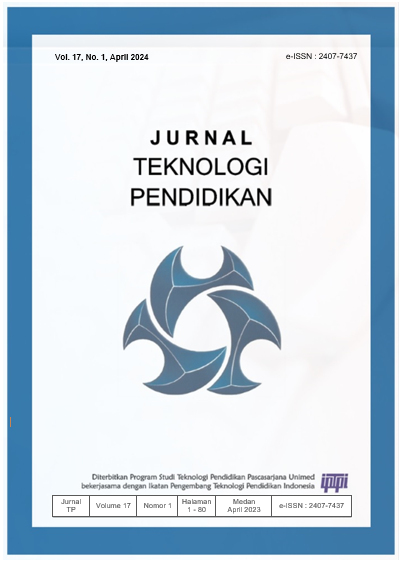EFEKTIFITAS PENERAPAN MODUL KENDALI BERBASIS PLC TERHADAP HASIL BELAJAR MAHASISWA JURUSAN PENDIDIKAN TEKNIK ELEKTRO UNIMED
DOI:
https://doi.org/10.24114/jtp.v17i1.57392Abstract
Abstrak: Tujuan dari penelitian ini adalah untuk mengetahui efektifitas dari modul kendali berbasis PLC dan peningkatan hasil belajar mahasiswa jurusan Pendidikan Teknik Elektro Fakultas Teknik Universitas Negeri Medan. Kompetensi lulusan jurusan Pendidikan Teknik Elektro Universitas Negeri Medan harus mampu memenuhi kebutuhan stakeholder khususnya dunia industri. Mahasiswa sangat membutuhkan media pembelajaran yang modern dan inovatif. Media pembelajaran juga harus dapat menyesuaikan dengan perkembangan teknologi kendali otomatis industri saat ini. Metode penelitian ini mengadaptasi rancangan penelitian quasi experiment (eksperimen semu) dengan menggunakan rancangan Non Equivalent Control Group Design. Berdasarkan analisis data penelitian, diperoleh nilai rata-rata hasil belajar mahasiswa sebesar 84,30. Hasil penelitian ini dapat dibuktikan dengan peningkatan skor rata-rata hasil belajar mahasiswa pada kelompok eksperimen, yaitu 63 pada saat pre-test dan 84,30 pada saat post-test. Berdasarkan hasil perhitungan gain score data pre-test dan data post-test hasil belajar mahasiswa kelompok eksperimen, diperoleh gain score 0,461 dalam kategori sedang. Sehingga dapat dikatakan bahwa modul kendali berbasis PLC efektif diterapkan kepada mahasiswa jurusan Pendidikan Teknik Elektro Fakultas Teknik Universitas Negeri Medan. Kata Kunci: Efektifitas, Modul, Kendali, PLC, UNIMED Abstract. The aim of this research is to determine the effectiveness of the PLC-based control module and increase the learning outcomes of students majoring in Electrical Engineering Education, Faculty of Engineering, Medan State University. The competency of graduates majoring in Electrical Engineering Education at Medan State University must be able to meet the needs of stakeholders, especially the industrial world. Students really need modern and innovative learning media. Learning media must also be able to adapt to current developments in industrial automatic control technology. This research method adapts a quasi-experiment research design using a Non-Equivalent Control Group Design. Based on research data analysis, the average student learning outcome value was 84.30. The results of this research can be proven by an increase in the average score of student learning outcomes in the experimental group, namely 63 at the pre-test and 84.30 at the post-test. Based on the results of calculating the gain score from pre-test data and post-test data on the learning outcomes of experimental group students, a gain score of 0.461 was obtained in the medium category. So it can be said that the PLC-based control module is effectively applied to students in Pendidikan Teknik Elektro Department Faculty of Engineering Universitas Negeri Medan. Keywords: Efektifitas, Modul Kendali, PLC, Teknik Elektro, UNIMEDReferences
Alam, A. W. S., & Suprianto, B. (2015). Pengembangan Trainer Parkir Mobil Sistem Informatif Sebagai Media Pembelajaran Pada Mata Diklat PLC Kelas XI Teknik Otomasi Industri SMK Negeri 3 Boyolangu Tulungagung. Jurnal Pendidikan Teknik Elektro, 4(3), 937“942.
Arikunto, S. (2010). Prosedur Penelitian Suatu Pendekatan Praktik (XIV). Rineka Cipta.
Aunurrahman, A. (2019). Belajar dan Pembelajaran (XI). Alfabeta.
Buchori, A., & Setyawati, R. D. (2015). Development learning model of charactereducation through e-comic in elementary school. International Journal of Education and Research, 3(9), 369“386.
Hakim, D. L., Somantri, Y., & Abdullah, A. G. (2009). DESAIN DAN IMPLEMENTASI MODUL LATIH PLC TERINTEGRASI DENGAN HUMAN MACHINE INTERFACE.
Hasan, H., Heyawan, W., & Suharto, I. (2020). Modul Pratikum Kendali Otomasi Industri Dasar Berbasis PLC Outseals. Jurnal ELIT, 1(1), 1“9. https://doi.org/10.31573/elit.v1i1.55
Hermawan, I. (2019). Metodologi penelitian pendidikan (kualitatif, kuantitatif dan mixed method). Hidayatul Quran.
Pratiwi, E. D., & Kurniawan, W. D. (2021). PENGEMBANGAN MODUL PRAKTIKUM PLC OMRON CP1E UNTUK MENUNJANG MATA KULIAH INSTRUMEN DAN KENDALI DI JURUSAN TEKNIK MESIN UNESA. 10.
Sari, L. P., Hatchi, I., & Siregar, D. A. (2019). Pengembangan Modul Ajar Berbasis Project Based Learning (PjBL) yang Praktis Bagi Mahasiswa Calon Guru Fisika. Jurnal Education and Development, 7(3), 87“87.
Setyosari, H. P. (2016). Metode penelitian pendidikan & pengembangan. Prenada Media.
Sugiyono, P. (n. d.). D. (2017). Metode Penelitian Pendidikan: Pendekatan Kuantitatif, Kualitatif, R&D (25th ed.). CV Alfabeta.
Sukmadinata, N. S. (2019). Metode penelitian pendidikan. PT Remaja Rosdakarya.
Yusro, M., Ma™sum, M., Muhamad, M., & Jaenul, A. (2021). Pengembangan Trainer Aplikasi Multi-Sensors (TAMS) Berbasis Arduino dan Raspberry Pi. Risenologi, 6(1), 77“85.
Downloads
Published
How to Cite
Issue
Section
License
Copyright (c) 2024 Jurnal Teknologi Pendidikan (JTP)

This work is licensed under a Creative Commons Attribution 4.0 International License.

Jurnal Teknologi Pendidikan (JTP) is licensed under a Lisensi Creative Commons Atribusi 4.0 Internasional.




